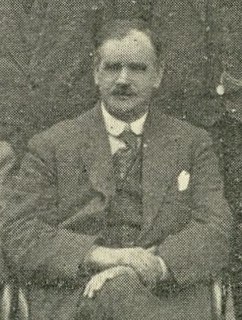Related Research Articles
Arthur Ernest Tiffin OBE, commonly known as Jock Tiffin or A. E. Tiffin, was the third general secretary of the British Transport and General Workers' Union (TGWU). He served for only a few months in 1955 before his death.

The Trades Union Congress (TUC) is a national trade union centre, a federation of trade unions in England and Wales, representing the majority of trade unions. There are 48 affiliated unions, with a total of about 5.5 million members. The current General Secretary is Frances O'Grady.

John Cecil Beard was a British trade unionist and politician.
William Kean was a British trade unionist.
The General Council of the Trades Union Congress is an elected body which is responsible for carrying out the policies agreed at the annual British Trade Union Congresses (TUC).
James Rowan was a British trade union leader.
The Parliamentary Committee of the Trades Union Congress was the leading body of the British trade union movement from 1871 until 1921.
Harry N. Harrison was a British trade unionist.
Henry Boothman was a British trade union leader.

Matthew Arrandale was a British trade unionist and politician.
Edward Haigh was a British trade unionist.
Walter Greendale was a British trade unionist and politician.
James Gilroy Baty was a British trade unionist.
Alfred Roberts was a British trade unionist.
Ellen Cecelia McCullough was a British trade unionist.
Albert Frederick Papworth, often known as Pappy, was a British trade unionist. A leader of several strikes, he later became the first communist to serve on the General Council of the Trades Union Congress.
Leonard Forden was a British trade unionist. He served on both the General Council of the Trades Union Congress and the National Executive Committee of the Labour Party.
Bernard Swindell was a British trade unionist, who served as chairman of the National Union of General and Municipal Workers (NUGMW).
Stanley Pemberton was a British trade unionist, who served as chair of the Transport and General Workers' Union.
Peter Hagger was a British trade unionist.
References
- ↑ Coates, Ken; Topham, Tony (1994). The making of the labour movement. Spokesman. ISBN 085124565X.
- ↑ Arthur Marsh and Victoria Ryan, Historical Directory of British Trade Unions, vol.3, p.129
- 1 2 "Obituary: Mr J. Davenport". Annual Report of the Trades Union Congress: 190. 1941.
- ↑ "Presentation to Mr Will Thorne, MP, and Mr J. Davenport". Annual Report of the Trades Union Congress: 406. 1934.